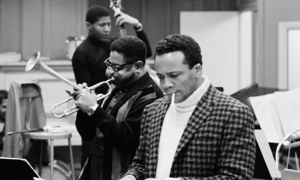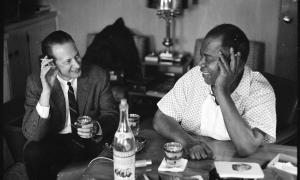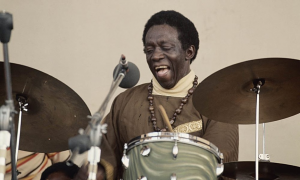Home » Jazz Articles » Big Band in the Sky » Remembering Dan Morgenstern
Remembering Dan Morgenstern

Courtesy Jack Bradley
[Dan had] a way with words that made me hear and feel things in the music that were positively intoxicating.
—Ricky Riccardi
In 1938 when Dan Morgenstern was eight years old, he and his mother fled Nazi-controlled Austria for Copenhagen. Nine years later, they arrived in New York, and Morgenstern was not interested in seeing the Statute of Liberty or the Empire State Building. He just wanted to go to 52nd Street.
Morgenstern, jazz writer, historian, jazz advocate and fan (and Jersey Jazz columnist), passed away in New York on September 7, 2024, at the age of 94. Everyone has a Dan Morgenstern story, and many of them will be related here, in addition to the numerous details about his glorious life and career.
Upon reaching New York, Morgenstern and his mother were reunited with his father, who had escaped to France before getting to the United States. With his father's help, 17-year-old Dan was hired as a trainee in the Time-Life mailroom and subsequently worked as a New York Times copy boy before being drafted into the Army. After returning to civilian life, he attended Brandeis University and discovered the Boston jazz scene, eventually meeting George Wein, who owned the Storyville Jazz Club and was about to launch the Newport Jazz Festival. Wein helped Morgenstern and his college friends hire Stan Getz to perform a concert on the Brandeis campus, and Morgenstern wrote about it for The Justice, the student newspaper. It was his first published jazz article. After graduating from Brandeis, he covered the Randall's Island Jazz Festival in 1959 for The New York Post and continued not only writing about jazz musicians but establishing personal friendships with them as well.
In an interview with the Smithsonian, Morgenstern wrote about a groundbreaking moment with tenor saxophonist Coleman Hawkins. "Coleman did a very big thing for me in terms of establishing me in the musicians' circle," he said. "Coleman was known for never buying anybody a drink. It's not that he was cheap. He once explained it to me—he said, 'You buy somebody a drink. Then they buy you one. You wind up drinking more than you really want.'
"Coleman had this big, booming voice," Morgenstern continued. "Even in a noisy bar you could hear him over the crowd; his voice really carried. One night he called out to me in the Copper Rail, one of the midtown musician watering holes: 'Danny! What are you drinking?' Everybody turned around and looked. That was like my invitation."
Morgenstern went on to edit Metronome and DownBeat magazines; he reviewed jazz for The Chicago Sun-Times; won eight Grammy Awards for his liner notes; was named a National Endowment for the Arts Jazz Master in 2007; and received three Deems Taylor Awards for excellence in music writing from the American Society of Composers, Authors, and Publishers. Two of the awards were for his books, Jazz People (Harry N. Abrams: 1976) and Living With Jazz (Pantheon: 2004). From 1976-2011, he served as Director of the Institute of Jazz Studies at Rutgers University-Newark, building that organization into one of the largest sources of jazz information and recordings in the world.
The foreword of Jazz people was written by Dizzy Gillespie, who complained about how Charlie Parker was treated while he was alive. "He was treated like a misfit by the society," Gillespie wrote. "As for some of the books about him, especially the so-called biography, they are fairy tales. Dan Morgenstern, I'm happy to say, doesn't write fairy tales."
In his last Dan's Den column for Jersey Jazz, Morgenstern remembered Michael Cuscuna, the Founder of Mosaic Records who passed away in April. Thanking Cuscuna "for all you've done for the music," Morgenstern mentioned that Cuscuna had found a new partner at Mosaic, Scott Wenzel, "who knows jazz from all aspects, including the perspective of a musician."
After hearing of Morgenstern's death, Wenzel said, "I'm sure we each have our moments when we first heard the name, Dan Morgenstern. For me, it was 1971, and I was given a birthday gift of the RCA Victor/Vintage Series LP called Swing, Vol.1. The notes were by Dan, and they gave me a clearer picture of the importance and brilliance of the music, which was new to this 11-year-old. Little did I know that I would spend many hours at the Institute of Jazz Studies some 20 years later to do research for Mosaic and become a friend of this beautiful man, Dan The Man. He used to see me walk in and say, 'Aaahh, the man from Mosaic' in his inimitable voice."
Morgenstern was a living history book for those too young to have seen and heard many of the jazz giants of the past. On Facebook, David Ostwald, Leader of the Louis Armstrong Eternity Band, described this unique role. "With beautiful writing and riveting first-hand reports, Dan brought to life people I revered but never met and history that shaped the present but had always felt hopelessly distant. He brought me to Louis Armstrong's side at the Roxy Theater when he first met Louis, to inside the studio where Louis made his only recording with Duke Ellington, to Brandeis University in 1948 where he produced an Art Tatum concert and where he heard and met Billie Holiday for the first of many times. He made me be there when James Baldwin, upon hearing Louis Armstrong play the national anthem at the 1957 Newport Jazz Festival, told him, 'That's the first time I liked that song.'"
Ricky Riccardi, Director of Research Collections at the Louis Armstrong House and author of two books about Armstrong (a third is on the way), wrote a lengthy Facebook tribute to Morgenstern, describing him as someone who "had a way with words that made me hear and feel things in the music that were positively intoxicating. Dan reminded me about the human beings making this music and made me always root for them... Maybe the saddest thing for me right now," Riccardi continued, "is that I was in the middle of going over the proofs for my next book when I got the word. I can only make very minor changes at this point, but the first acknowledgement in the back of the book was for Dan; now I must change the present tense verbs to past." Riccardi added, however, that, "Like the musicians he loved and championed, Dan Morgenstern is immortal."
Vincent Pelote, Senior Archivist Digital Preservation Strategist at the Institute of Jazz Studies, worked with Morgenstern from 1978 until Morgenstern's retirement in 2011. "I was in awe of him," Pelote told me, "because as a record collector I read numerous album notes penned by him and purchased many albums based solely on his informative and insightful notes. Dan had an encyclopedic knowledge of jazz. He, at some point, was the last of the jazz historians who knew and hung out with some of the legendary figures like Louis Armstrong, Hot Lips Page, Roy Eldridge, Coleman Hawkins, and so many others. He gave us insight into the personalities of figures that most of us only knew through books, magazine articles, and sound recordings. He elevated the art of writing album notes to a level that few have been able to match."
Pianist Emmet Cohen was thrilled when Morgenstern agreed to write the album notes to Volumes 1 and 2 of Cohen's Master Legacy Series. In Volume 1, which featured Cohen playing with drummer Jimmy Cobb, Morgenstern wrote about the joy of finding "a young dynamo musician who is so committed to connecting the music's present with its rich past, and who understands that past so very well..." Volume 2, featuring a collaboration with legendary bassist Ron Carter, also included another young musician, drummer Evan Sherman. Morgenstern gave him a shout out: "talented drummer Evan Sherman," he wrote, "new to me but not to Ron Carter."
Loren Schoenberg, tenor saxophonist and Senior Scholar at the National Jazz Museum in Harlem, pointed out, on Facebook, that, "it's not just musicians who have influenced the ecology of jazz during its century of ascendancy. Although neither a grandstander nor a bandstander, Dan Morgenstern deserves a special place in the history and continuing evolution of this great American art form... Through his voluminous writing, pioneering leadership of the Institute of Jazz Studies at Rutgers University, and stewardship of major jazz publications, Dan always remained far above the partisan battles... He championed the cause of so many artists, paying no heed to the fads of the day."
Pianist/vocalist Daryl Sherman called Morgenstern a "one-of-a-kind true gentleman. He could hear multi levels of tonal effects in recordings or live music and translate with just the right word to enhance a listener's experience.
"Also, Dan loved songs—all kinds. His IJS colleague and dear friend, Vincent Pelote, pointed out that, 'Dan fancied himself a bit of a crooner.' Vince got to accompany him on guitar. But it was at the annual New Orleans Satchmo Summerfests that launched him as a crooner. Producer Marci Schram didn't have to nudge hard to get Dan to get up and sing with David Ostwald's band. Later, it became a tradition in New York at Ostwald's steady Birdland gig. Dan would sing on his October birthday Being a pianist, singer, and good friend, I got the title, 'first call pianist and vocal coach.' We rehearsed only on the phone. It was a challenge, especially trying to find his key. However, Dan knew just what he wanted to sing and how—mostly Louis-related, but sometimes he'd throw in a charmer like 'Never Swat a Fly' or ("I'll Be Glad When You're Dead) You Rascal You.' It really knocked us all out."
At the end of Jazz people, Morgenstern brilliantly put jazz into perspective. "Every jazz musician," he wrote, "has a special story to tell, for jazz is above all a music of individual expression within a collective framework. It is also, despite the advances made in recent years, an art and craft that demands much, too much, from its practitioners. Its circumstances are physically and spiritually taxing, and while it is often hailed as an art, it is still treated as a commodity.
"Yet, jazz prevails. It continues to cut across boundaries of race, class, culture, and language. It has been one of the lights in the tunnel of the twentieth century. Born in slavery, it has become the universal song of freedom, a celebration of the resilience and power of the human spirit. In our time, especially, that is no small achievement."
Morgenstern is survived by his wife, Elsa, and two sons, Adam Oran (named for the trumpeter Oran "Hot Lips" Page) and Joshua Louis (named for Louis Armstrong).
Tags
Big Band in the Sky
Dan Morgenstern
Sanford Josephson
George Wein
Stan Getz
Coleman Hawkins
Dizzy Gillespie
Charlie Parker
Michael Cuscuna
Scott Wenzel
David Ostwald
duke ellington
Art Tatum
Billie Holiday
Ricky Riccardi
Vincent Pelote
Hot Lips Page
Roy Eldridge
Emmet Cohen
Jimmy Cobb
Ron Carter
Evan Sherman
Loren Schoenberg
Daryl Sherman
Marci Schram
Comments
PREVIOUS / NEXT
Support All About Jazz
 All About Jazz has been a pillar of jazz since 1995, championing it as an art form and, more importantly, supporting the musicians who make it. Our enduring commitment has made "AAJ" one of the most culturally important websites of its kind, read by hundreds of thousands of fans, musicians and industry figures every month.
All About Jazz has been a pillar of jazz since 1995, championing it as an art form and, more importantly, supporting the musicians who make it. Our enduring commitment has made "AAJ" one of the most culturally important websites of its kind, read by hundreds of thousands of fans, musicians and industry figures every month.





























